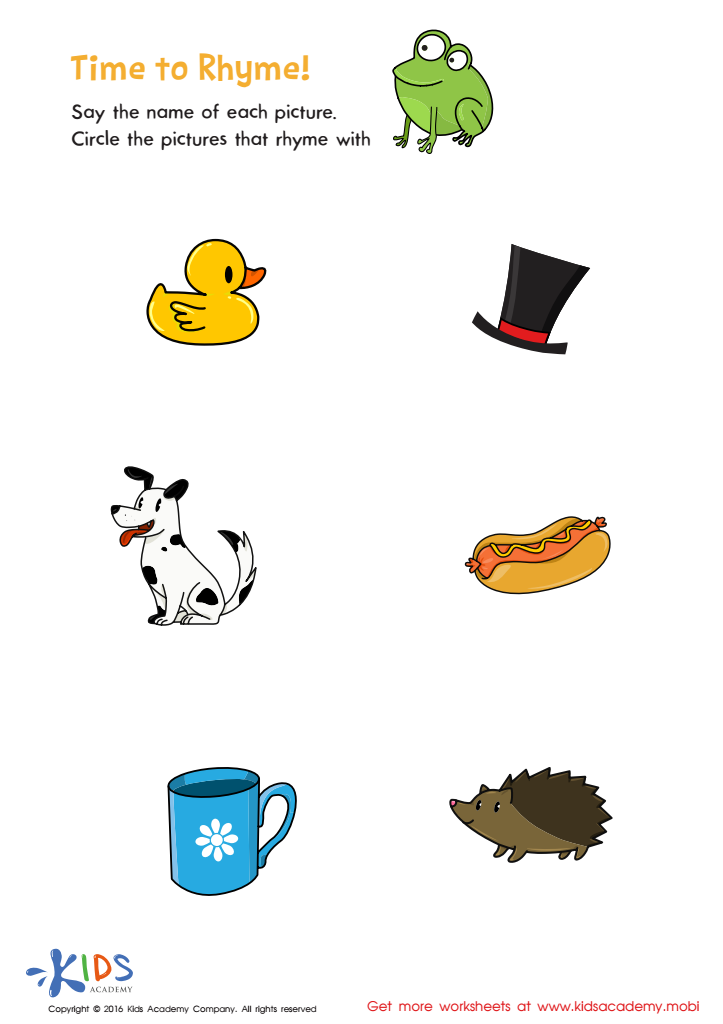Recognize Words that Rhyme - Lesson for Preschool, Chapter - Phonological Awareness
In the "Recognize Words that Rhyme" lesson, preschool students embark on a delightful journey to enhance their phonological awareness, a crucial component of early literacy skills. Through engaging activities such as the "Down by the Bay" song, and various rhyming worksheets like "First Words: Picture Rhymes," "Time to Rhyme," and "Rhyming Pairs," children will learn to identify words that sound alike. This lesson is designed to sharpen their listening skills, allowing them to distinguish between different sounds in words, a foundational skill for reading readiness.
Understanding and recognizing rhymes helps in developing an ear for the sound patterns that make up language, an essential step towards effective communication and language proficiency. It also aids in vocabulary building, as students are introduced to new words in a fun and memorable context. Moreover, rhyming activities bolster memory and cognitive skills, as children learn to predict and recall words that rhyme, enhancing their ability to learn and remember new information.
This lesson is fundamental because it sets the stage for reading success by fostering a love for language through playful and interactive learning.

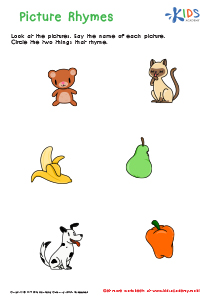
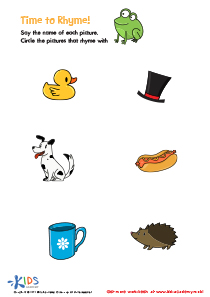
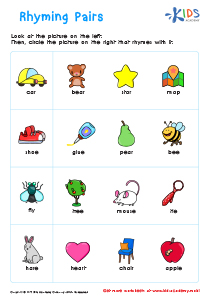
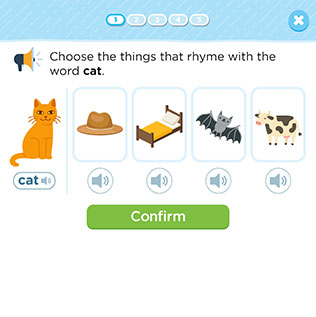
-
Activity 1 / Down by the Bay | Song
-
Activity 2 / First Words: Picture Rhymes Worksheet
Rhyming isn’t just important to poets and rap artists! Kids need to learn rhyming words to teach them about language, and helps kids learn to read and write. This picture rhymes printable worksheet will help sharpen your child’s problem solving and cognitive skills using vibrant and engaging pictures.
This worksheet will help your child:
• Identify each picture and the word associated with it
• Think about which words rhyme as they work their problem-solving skills
• Complete mental tasks to help strengthen cognitive skills
• Recognize rhyming words.
For an extended lesson, help your child to write each word under each picture. Allow them to see how the rhyming words look similar, using most of the same letters. This will help your child to learn more about how language works in both reading and writing. -
Activity 3 / Rhyming Worksheet: Time to Rhyme Rhyming Worksheet
Do you want a worksheet that can keep your child learning and engaged for longer than just a few minutes? Here’s a fabulous printable rhyming words worksheet that can double as a coloring sheet! Help your child to express his or her creativity and artistic skills while they think about rhyming words and language!
This worksheet will help your child:
• Recognize and identify rhyming words
• Practice completing mental tasks to improve cognition and focus
• Express their creativity through coloring.
For added learning, help your child write the word for each picture, to help them identify similarities in rhyming words while both reading and writing. If they want to color all the pictures, encourage them to circle the rhyming pictures for more coloring fun! -
Activity 4 / Rhyming Pairs Worksheet
Rhyming is a critical precursor to reading, and because research continues to show that kids who struggle rhyming also struggle with reading, it’s important that kids get plenty of practice with this vital skill.
If you’re looking for more ways your child can practice with rhymes, then you’ve come to the right place! Your child will practice this important skill while they enjoy adorably vibrant pictures on this rhyming pairs worksheet. Free printable worksheets like this one are a great way for your child to get some extra practice.
Just like all our worksheets, on this one you’ll find:
• Clear and simple directions
• Engaging, colorful images to delight your child
• Just enough practice to keep your child’s attention.
Your child will work on:
• Logical reasoning skills
• Problem solving skills
• Making connections between words and their pictures
• Practice reading common words
• Recognizing which words and sounds rhyme, and which do not.
Rhyming is such an important skill for preschoolers because the knowledge of words and their sounds are important for kids as they learn to decode the sounds in words they read. Learning rhyming words and pairs can help your child build an awareness of words and their sounds, building a toolbox they can use as they begin to read. Print this worksheet today for valuable rhyming practice! -
Activity 5 / Recognize Words That Rhyme - Quiz
In this assessment, students will use their knowledge of sound relationships to identify rhyming words

